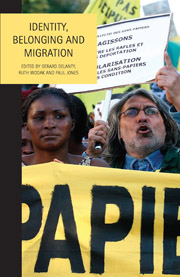Book contents
- Frontmatter
- Contents
- Acknowledgements
- List of Figures
- Notes on Contributors
- Introduction: Migration, Discrimination and Belonging in Europe
- I Theoretical Perspectives on Belonging
- II Institutional Forms of Discrimination
- 5 Racism, Anti-Racism and the Western State
- 6 What Space for Migrant Voices in European Anti-Racism?
- 7 Multiculturalization of Societies: The State and Human Rights Issues
- 8 Towards a Theory of Structural Discrimination: Cultural, Institutional and Interactional Mechanisms of the ‘European Dilemma’
- 9 On Institutional and Agentic Discrimination: Migrants and National Labour Markets
- 10 Non-Place Identity: Britain's Response to Migration in the Age of Supermodernity
- III Cases of Belonging and Exclusion
- Conclusion: Discrimination as a Modern European Legacy
- Index
5 - Racism, Anti-Racism and the Western State
from II - Institutional Forms of Discrimination
- Frontmatter
- Contents
- Acknowledgements
- List of Figures
- Notes on Contributors
- Introduction: Migration, Discrimination and Belonging in Europe
- I Theoretical Perspectives on Belonging
- II Institutional Forms of Discrimination
- 5 Racism, Anti-Racism and the Western State
- 6 What Space for Migrant Voices in European Anti-Racism?
- 7 Multiculturalization of Societies: The State and Human Rights Issues
- 8 Towards a Theory of Structural Discrimination: Cultural, Institutional and Interactional Mechanisms of the ‘European Dilemma’
- 9 On Institutional and Agentic Discrimination: Migrants and National Labour Markets
- 10 Non-Place Identity: Britain's Response to Migration in the Age of Supermodernity
- III Cases of Belonging and Exclusion
- Conclusion: Discrimination as a Modern European Legacy
- Index
Summary
Racism and ethnic discriminations are under continuous historical and sociological examination. But anti-racism is consigned to the status of a ‘cause’, fit only for platitudes of support or denouncement.
Bonnett 2000: 2In his book, Anti-Racism, Alastair Bonnett points out the paucity of research into anti-racism. Indeed, the discourse and political practice of anti-racism has generally been considered to be the mere opposite of racism, and as such undeserving of specific attention. In this chapter, I argue that, contrary to such a view, understanding anti-racism is central to making sense of ‘race’ and racism in the West since the Second World War. The end of the last World War and the full unveiling of the Nazi ‘final solution’ is a key moment in this regard. In the years that followed, anti-racist scientists and thinkers developed explanations for racism and proposed solutions for combating its persistence. These precepts formed the backbone of the approach to racism, or the more acceptably termed ‘discrimination’, taken by governments, supranational institutions and ‘mainstream’ groups in civil society, such as trade unions, church and solidarity organizations.
The argument I make concerns western Europe generally: although national contexts and their varying histories of colonialism and immigration all differ, official discourses generally offer a similar interpretation of racism. According to this interpretation, racism is a perversion of the logical course of modern politics that comes to affect western political culture from beyond the pale.
- Type
- Chapter
- Information
- Identity, Belonging and Migration , pp. 101 - 119Publisher: Liverpool University PressPrint publication year: 2011
- 1
- Cited by



